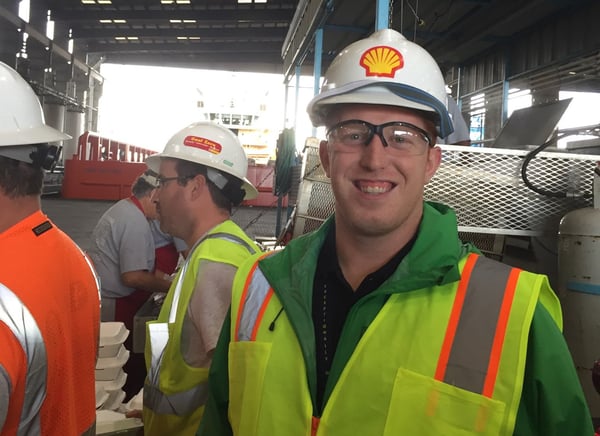Getting To Know The Future Of Supply Chain
Gabrielle Salgado September 14, 2018
The fact is that the procurement and supply chain profession is in the midst of a revolution, getting more global, analytical, and tech-savvy than ever before. It’s also getting younger — 40% of the buyers on the Thomas Network at Thomasnet.com are between the ages of 18 and 34.
This emerging generation of professionals aren’t just up-and-comers — they’ve arrived. Many are in leadership positions, heading up initiatives and driving discussions on the other side of your negotiating table. Knowing what makes them tick can help you forge better relationships with these important players in the supply chain.
With that in mind, we’d like to introduce you to Tanner Ryan. Tanner is one of the 2017 30 Under 30 Rising Supply Chain Stars, a distinguished group of supply chain professionals who have made an indelible impact on supply chain — and their companies — before their thirtieth birthdays.
We caught up with Ryan to discuss his career, what’s important to procurement professionals, and the future of the supply chain. 
Destined For Success
From a young age, Ryan knew he wanted to pursue a career in supply chain management. He grew up watching his father, who was involved in international freight forwarding and introduced him to logistics, and his mother, who was a nurse and instilled in him a problem-solving mentality. The rest, as they say, is history.
Ryan chose supply chain over other career paths, he says, because “I really wanted to be interacting with people constantly. I realized the things I wanted to do involved a lot more interaction and being out in the field, seeing things move. And that related a lot more to supply chain.”
Promising Beginnings
After graduating from the Leeds School of Business, Ryan started a position at Shell that allowed him to move away from his home state of Colorado. Ryan says he always knew he wanted to travel for work, so “I decided to take the plunge into that, and move up to Anchorage.”
Over the course of the next seven months, he worked to decommission the entire Shell operation in Alaska, which relieved the company of $2.5 million in operations materials.
“It was a huge eye opener to a piece of business that a lot of people I work with today have never seen, the end of a project,” he said. Some of Ryan’s most challenging responsibilities included managing the removal of 15 years’ worth of materials, everything from plastics, to computers, to giant warehouse facilities.
When the decommissioning was complete, Ryan had the opportunity to go to New Orleans to work on Shell’s Offshore Logistics team. He organized transportation, including trucking, boats, and helicopters, to and from the rigs.
“That was an incredibly complex supply chain,” he said, “With how many vendors we had all the way from Alabama to Texas, for anything from nuts and bolts, to big tools, to food and waste facilities.”
Full Circle
After working in New Orleans, Ryan was offered the chance to move back to Colorado.
“This just magically popped up, and I was ready to get back to Denver,” he said. “It was the right kind of job, the right next step, and timing worked out.”
Ryan now manages all of Shell’s trucking operations in the Rocky Mountain region. He’s in charge of communicating and working with truck dispatchers to oversee the shipment of crude oil from the wells to refineries and pipelines.
In the future, Ryan sees himself growing within the field. “Ideally, I’d love to be a manager or team leader within supply chain,” he noted. “I’d love to work with people, and accomplish a much larger goal by leveraging their skills.”
The Future of Supply Chain
Ryan sees the evolution of his industry being driven by technology. “I think we’re only going to get more and more global and more reliant on technology,” he said. “Especially with automation, whether in factories or in vehicles, technology and supply chain are really becoming one."
When it comes to explaining the importance of supply chain, Ryan said it best, “Sometimes I feel like it can be similar to the Wizard of Oz, where no one pulls back the curtain to see what’s behind it, they just expect it to work. I wish people knew everything that went into building that network from contracts, to the boots on the ground, to the energy needed to pull it all together.”
Advice for Young Leaders
Ryan has advice for young professionals looking to start a career in supply chain management. “Always remember it’s about your results, you have to deliver,” he said. “It’s the same thing that I hope people learn from kindergarten all the way through college is that you have to turn in your homework to be successful.”
Regarding social media, he adds, “I think that a lot of people are not well versed in the etiquette that you need when everything is public on the Internet. It’s just like when you go to a conference, you don’t show up in shorts and a T-shirt; because you’re representing yourself and your company, you show up in your suit and tie and you act appropriately in real life as you also should on the Internet.”
Connect With The Next Generation Of Buyers
The supply chain — and the people who work within it — are changing, and talented young professionals like Tanner are a big reason why. If you’d like to connect with them, then join them on the Thomas Network at Thomasnet.com.
Did you find this useful?









